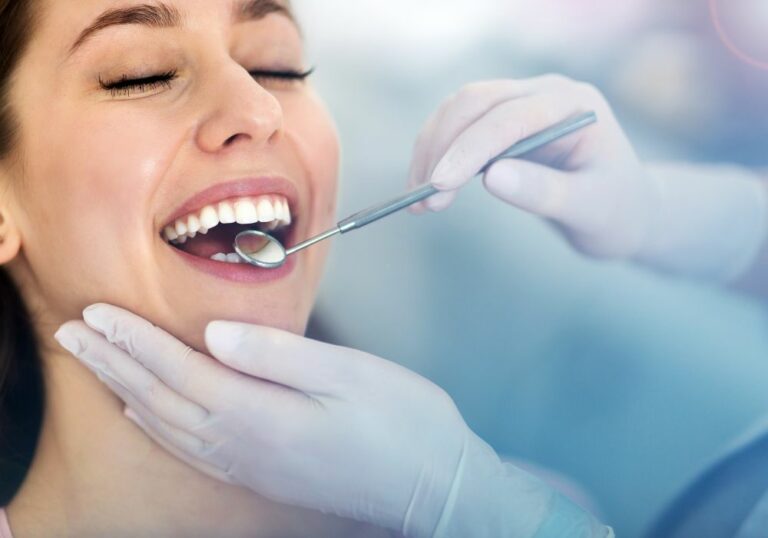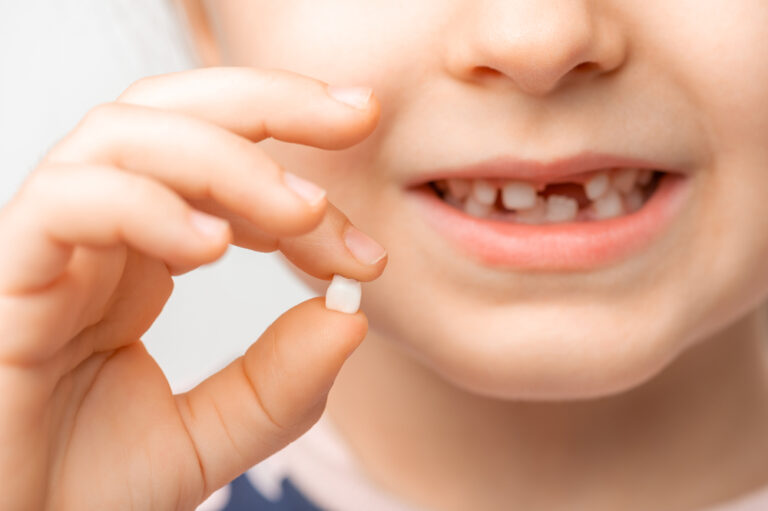Are you wondering if it’s safe to brush your teeth more than twice a day? The answer is not a simple yes or no. While brushing your teeth twice a day is the general recommendation, some situations may call for more frequent brushing. However, there are also risks associated with brushing your teeth too often.
The American Dental Association recommends brushing your teeth twice a day with fluoride toothpaste for at least two minutes each time. This helps remove food particles and plaque from your teeth, which can cause tooth decay and gum disease. However, if you have certain conditions such as dry mouth or acid reflux, you may need to brush your teeth more frequently. On the other hand, overbrushing can also lead to problems such as enamel erosion and gum recession. So, how do you strike a balance?
In this article, we will explore the benefits and risks of brushing your teeth more than twice a day. We will also provide tips on how to maintain good oral hygiene without damaging your teeth and gums. Whether you’re a frequent brusher or simply curious about the topic, keep reading to learn more.
Understanding Tooth Brushing Frequency
Brushing your teeth is an important part of maintaining good oral hygiene. However, it can be confusing to know how often you should brush your teeth. Some people believe that brushing more than twice a day is unnecessary, while others believe that brushing after every meal is necessary. So, can you brush your teeth more than two times a day? Let’s explore tooth brushing frequency in more detail.
The American Dental Association recommends brushing your teeth twice a day with fluoride toothpaste for at least two minutes each time you brush. Brushing twice a day helps to remove food and plaque from your teeth, which can help prevent tooth decay and gum disease. However, if you have food stuck in your teeth or have eaten sugary or sticky foods, it’s best to remove it by brushing your teeth.
Brushing your teeth more than twice a day is not necessary, but it won’t necessarily harm your teeth either. In fact, brushing more than twice a day can be beneficial for people who are at a high risk of developing tooth decay or gum disease. However, it’s important to brush gently and avoid brushing too hard, as this can damage your teeth and gums.
If you do decide to brush your teeth more than twice a day, make sure to use a soft-bristled toothbrush and fluoride toothpaste. You can also keep floss or interdental brushes handy for quick touch-ups throughout the day.
In conclusion, brushing your teeth twice a day is recommended by the American Dental Association, but brushing more than twice a day can be beneficial for some people. It’s important to brush gently and avoid brushing too hard, as this can damage your teeth and gums.
Benefits of Brushing More Than Twice a Day
Brushing your teeth twice a day is a standard recommendation for good oral hygiene. However, brushing your teeth more than twice a day can have some benefits as well. Here are a few benefits of brushing more than twice a day:
- Prevents bad breath: Brushing your teeth more than twice a day can help prevent bad breath. Bad breath is often caused by the buildup of bacteria in your mouth. By brushing your teeth more frequently, you can remove the bacteria and keep your breath fresh.
- Reduces the risk of cavities: Brushing your teeth more than twice a day can help reduce the risk of cavities. Cavities are caused by the buildup of plaque on your teeth. By brushing your teeth more frequently, you can remove the plaque and prevent cavities.
- Keeps your teeth clean: Brushing your teeth more than twice a day can help keep your teeth clean. When you eat, food particles can get stuck in your teeth. By brushing your teeth more frequently, you can remove the food particles and keep your teeth clean.
- Reduces the risk of gum disease: Brushing your teeth more than twice a day can help reduce the risk of gum disease. Gum disease is caused by the buildup of plaque on your teeth and gums. By brushing your teeth more frequently, you can remove the plaque and prevent gum disease.
- Improves overall health: Brushing your teeth more than twice a day can improve your overall health. Poor oral hygiene has been linked to a number of health problems, including heart disease, diabetes, and stroke. By brushing your teeth more frequently, you can improve your oral hygiene and reduce your risk of these health problems.
In conclusion, brushing your teeth more than twice a day can have some benefits. However, it is important to note that excessive brushing can also be harmful to your teeth and gums. It is recommended to consult with your dentist to determine the best brushing frequency for your specific oral health needs.
Potential Risks of Over-Brushing
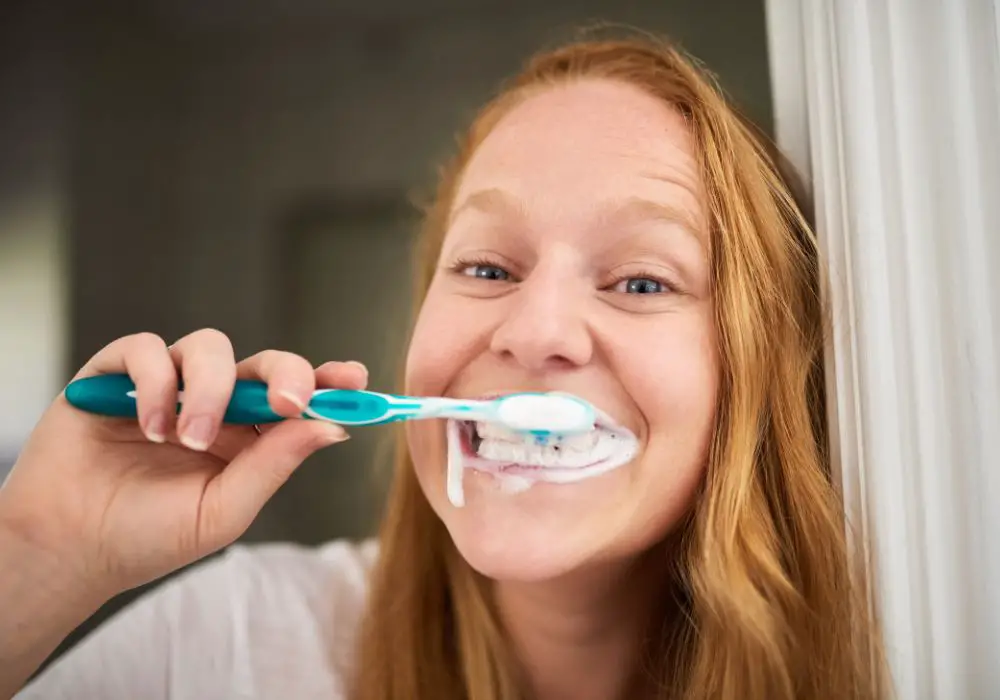
Brushing your teeth is an essential part of maintaining good oral hygiene. However, over-brushing can be harmful to your teeth and gums. Here are some potential risks of over-brushing:
Tooth Sensitivity
Brushing your teeth too hard or too often can cause your tooth enamel to wear down, which can lead to tooth sensitivity. This means that your teeth may feel uncomfortable or painful when you consume hot or cold foods and drinks.
Gum Recession
Over-brushing can also cause your gums to recede, which exposes the tooth roots and could lead to tooth sensitivity and other gum-related issues.
Dental Abrasion
Brushing your teeth too vigorously can cause dental abrasion, which refers to the loss of tooth structure by mechanical forces from a foreign object. This can lead to tooth sensitivity and gum recession.
Damage to Tooth Enamel
Brushing your teeth too much or too hard can cause damage to your tooth enamel, which is the protective outer layer of your teeth. This can lead to tooth decay and other dental problems.
Irritation of Gums
Over-brushing can also cause irritation of your gums, which can lead to bleeding and inflammation. This can make your gums more sensitive and can also damage your teeth and gums over time.
To avoid these potential risks, it is recommended that you brush your teeth twice a day for two minutes each time, using a soft-bristled toothbrush and gentle circular motions. Be sure to also floss once a day and visit your dentist regularly for check-ups and cleanings.
Professional Opinions on Brushing Frequency
According to the American Dental Association (ADA), brushing your teeth twice a day with fluoride toothpaste for at least two minutes each time you brush is recommended. This helps to remove food and plaque from teeth, which can cause tooth decay and gum disease. The ADA also advises that you should floss once a day to remove plaque and food particles from between your teeth.
Brushing your teeth too much can be harmful, according to dental professionals. Brushing too hard or too frequently can cause your teeth to become more sensitive and can also damage your gums by causing them to recede and expose the root area. Brushing too often can also wear down tooth enamel and cause cavities.
While there isn’t a maximum number of times to brush your teeth, generally brushing them more than three times a day is unnecessary and could prove harmful. You should also avoid brushing too hard or using abrasive toothpastes and brushes, as this can also cause damage to your teeth and gums.
It’s important to note that everyone’s dental needs are different, and you should consult with your dentist to determine the best brushing frequency for your individual needs. Your dentist can also recommend the best toothbrush and toothpaste for your specific dental needs.
Alternatives to Frequent Brushing
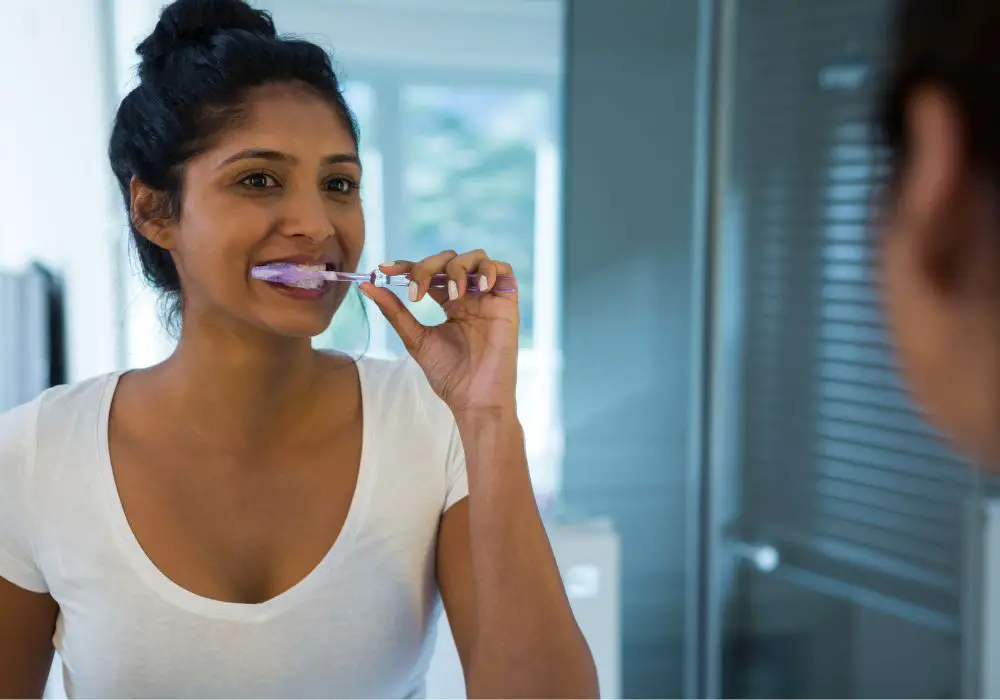
Brushing your teeth is an essential part of maintaining good oral hygiene. However, brushing your teeth too often can be harmful to your teeth and gums. If you find yourself wanting to brush your teeth more than two times a day, here are some alternatives to consider:
Use Mouthwash
Mouthwash is an excellent alternative to brushing your teeth frequently. It helps to remove bacteria, freshen your breath, and prevent cavities. Using mouthwash after meals can help to keep your mouth clean and healthy.
Chew Sugarless Gum
Chewing sugarless gum is another alternative to frequent brushing. It helps to stimulate saliva production, which can help to clean your teeth and neutralize harmful acids in your mouth. Look for gum that contains xylitol, a natural sweetener that can help to prevent tooth decay.
Drink Plenty of Water
Drinking plenty of water throughout the day can help to keep your mouth clean and healthy. Water helps to rinse away food particles and bacteria, preventing them from building up on your teeth and gums. Drinking water can also help to keep your mouth hydrated, reducing the risk of dry mouth.
Use Dental Floss
Dental floss is an essential tool for maintaining good oral hygiene. It helps to remove food particles and bacteria from between your teeth, where your toothbrush can’t reach. Flossing once a day can help to keep your teeth and gums healthy.
Visit Your Dentist Regularly
Regular dental check-ups and cleanings are essential for maintaining good oral hygiene. Your dentist can help to identify any issues early on and provide treatment before they become more serious. They can also provide advice on how to maintain good oral hygiene at home.
Remember that brushing your teeth too often can be harmful to your teeth and gums. If you find yourself wanting to brush your teeth more than two times a day, consider these alternatives to maintain good oral hygiene.
Importance of Proper Brushing Technique
Brushing your teeth is an essential part of your daily oral hygiene routine. It helps remove plaque, food particles, and bacteria that can cause tooth decay and gum disease. However, it’s not just how often you brush that matters, but also how you brush.
Proper brushing technique is crucial to maintaining good oral health. Here are some tips to ensure you are brushing your teeth correctly:
- Use a soft-bristled toothbrush: Hard bristles can damage your teeth and gums. A soft-bristled brush is gentle enough to clean your teeth effectively without causing any harm.
- Brush for at least two minutes: This is the recommended time for optimal cleaning. Divide your mouth into four quadrants and spend 30 seconds brushing each one.
- Use fluoride toothpaste: Fluoride helps strengthen your tooth enamel and prevent cavities. Look for toothpaste that contains fluoride and has the American Dental Association (ADA) seal of approval.
- Angle your brush: Angle your brush at a 45-degree angle to your gum line and use gentle circular motions to clean the front, back, and top of your teeth.
- Don’t forget to brush your tongue: Bacteria can accumulate on your tongue, leading to bad breath and other oral health problems. Use your toothbrush or a tongue scraper to clean your tongue.
- Don’t brush too hard: Brushing too hard can damage your teeth and gums. Use a gentle touch and let the bristles do the work.
By following these tips, you can ensure that you are brushing your teeth properly and maintaining good oral health. Remember to brush at least twice a day and visit your dentist regularly for check-ups and cleanings.
Role of Dental Products in Oral Hygiene
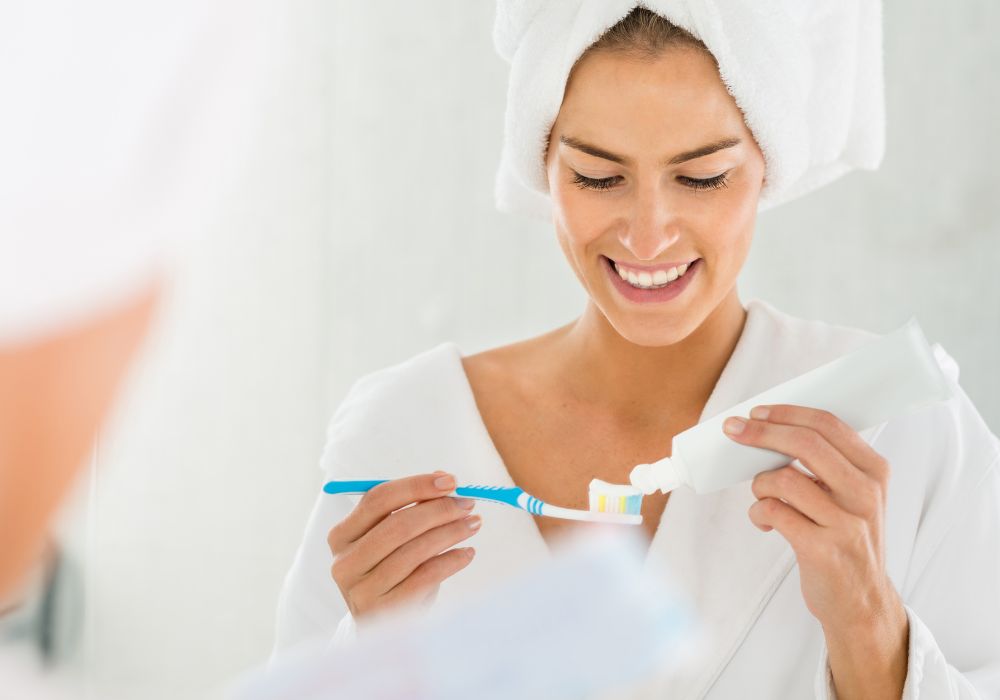
Maintaining good oral hygiene is essential to keep your teeth and gums healthy. Along with regular brushing and flossing, dental products can play a significant role in promoting oral hygiene. Here are some common dental products and their benefits:
Toothpaste
Toothpaste is a key component of your daily oral hygiene routine. It contains fluoride, which helps to strengthen your tooth enamel and prevent cavities. Toothpaste also contains mild abrasives that help to remove surface stains and keep your teeth looking clean and bright. When selecting a toothpaste, look for one that has the American Dental Association (ADA) seal of approval.
Toothbrush
A good toothbrush is essential for effective oral hygiene. Choose a toothbrush with soft bristles to avoid damaging your gums and tooth enamel. Electric toothbrushes are also a great option as they can help to remove more plaque than manual toothbrushes. Remember to replace your toothbrush every three to four months or when the bristles become worn.
Floss
Flossing is an important part of your oral hygiene routine as it helps to remove plaque and food particles from between your teeth. There are several types of floss available, including waxed, unwaxed, flavored, and unflavored. Choose a type of floss that you find easy to use and fits comfortably between your teeth.
Mouthwash
Mouthwash can help to freshen your breath and kill bacteria in your mouth. Look for a mouthwash that contains fluoride to help strengthen your tooth enamel. Mouthwash can also be helpful for people with braces or other orthodontic appliances as it can reach areas that may be difficult to clean with a toothbrush or floss.
In conclusion, dental products play an important role in maintaining good oral hygiene. By using toothpaste, a toothbrush, floss, and mouthwash, you can help to keep your teeth and gums healthy and prevent dental problems.
Influence of Diet on Oral Health
Your diet plays a significant role in maintaining good oral health. What you eat and drink can affect your teeth and gums in positive or negative ways. Here are some tips on how to maintain a healthy diet for your oral health:
Foods that Benefit Dental Health
Certain foods can help keep your teeth and gums healthy. These include:
- Calcium-rich foods, such as milk, cheese, and yogurt, which help strengthen your teeth and bones.
- Foods high in vitamin C, such as citrus fruits, strawberries, and broccoli, which help prevent gum disease.
- Foods high in fiber, such as fruits, vegetables, and whole grains, which help clean your teeth and stimulate saliva production.
- Green and black teas, which contain compounds that can help prevent cavities and gum disease.
Foods that Harm Dental Health
Some foods and drinks can harm your teeth and gums. These include:
- Sugary and acidic foods and drinks, such as soda, candy, and fruit juice, which can erode your tooth enamel and cause cavities.
- Sticky and chewy foods, such as caramel and gummy candies, which can stick to your teeth and promote tooth decay.
- Starchy foods, such as potato chips and bread, which can get stuck in your teeth and feed bacteria that cause cavities.
Snacking and Oral Health
Snacking can be harmful to your teeth and gums if you choose the wrong foods. Frequent snacking can also increase your risk of cavities. If you do snack, choose foods that are low in sugar and starch, such as raw vegetables, nuts, and cheese. Avoid snacking on sugary or sticky foods, and try to limit your snacking to once or twice a day.
By following a healthy diet for your oral health, you can help prevent cavities, gum disease, and other oral health problems. Remember to brush your teeth twice a day, floss daily, and visit your dentist regularly for check-ups and cleanings.
Frequently Asked Questions
Is brushing your teeth 3 times a day bad?
Brushing your teeth three times a day is not necessarily bad for you, as long as you are using proper technique and not brushing too hard. However, it is important to note that excessive brushing can lead to enamel erosion and gum recession. If you are concerned about brushing too much, it is always best to consult with your dentist.
Disadvantages of brushing teeth twice a day
There are no significant disadvantages of brushing your teeth twice a day, as long as you are using proper technique and a fluoride toothpaste. However, brushing too hard or using a hard-bristled toothbrush can lead to enamel erosion and gum recession. It is also important to note that brushing alone is not enough to maintain good oral health. Flossing and regular dental check-ups are also important.
Should I brush my teeth after every meal?
While it may seem like a good idea to brush your teeth after every meal, it is not always necessary. Brushing too often can actually damage your teeth and gums. Instead, it is recommended to wait at least 30 minutes after eating before brushing your teeth to allow saliva to neutralize the acid in your mouth. It is also important to floss daily and visit your dentist regularly.
How long should I brush my teeth with an electric toothbrush?
When using an electric toothbrush, it is recommended to brush for at least two minutes, twice a day. Many electric toothbrushes have built-in timers to help ensure that you are brushing for the recommended amount of time. It is also important to use proper technique and not apply too much pressure to avoid damaging your teeth and gums.
How many times should you brush your teeth a day?
The American Dental Association recommends brushing your teeth twice a day for two minutes each time. This is enough to remove plaque and bacteria from your teeth and gums. However, if you have braces or other dental appliances, your dentist may recommend brushing more frequently to maintain good oral hygiene.
Will brushing my teeth 3 times a day make them whiter?
Brushing your teeth three times a day may help remove surface stains and make your teeth appear whiter. However, it is important to note that brushing alone is not enough to achieve significant whitening results. If you are looking to whiten your teeth, it is best to consult with your dentist to determine the best course of treatment for you.




